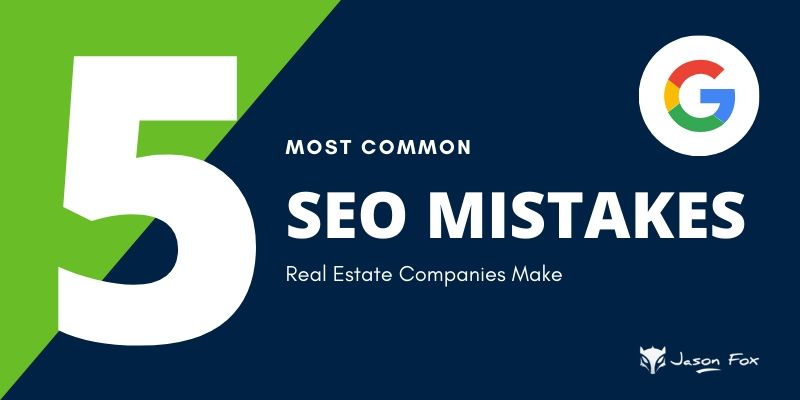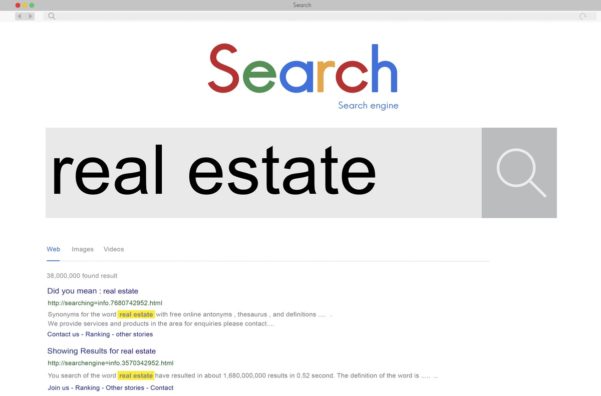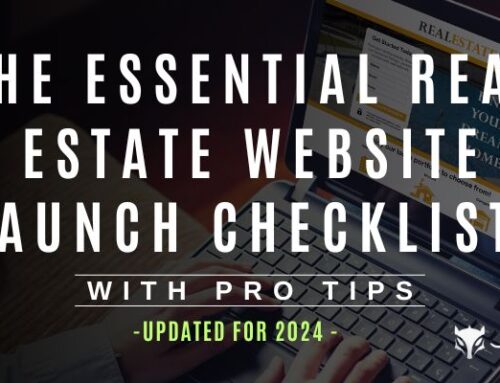Selling a home will never be an online-only deal, since people will always want to check out the look and feel of the neighborhood, the vibe of the house itself, and if they would mind the Nosey Ned Neighbor next door.
However, much like every other industry that has gladly entered the 21st century, the digital realm has changed the way realtors do business.
It has become necessary to create a web presence that stands out and doesn’t invoke images of low-quality, ad-packed websites that look like a front for illicit activities.
It has become necessary to create a Real Estate web presence that stands out and doesn’t invoke images of low-quality, ad-packed websites that look like a front for illicit activities.Click To TweetYou know the kind, where grammar is merely a distant dream and shiny banners promise you a million-dollar reward since you’re always the one thousandth visitor on the site. You need to present yourself as a trustworthy, expert entity, one that people would entrust with the business of buying their home.
It all begins online. In fact, the National Association of Realtors has published a research paper noting down that in 2019, 44% of all buyers looked for homes online first.
Another tidbit of useful data? Many of them actually did the research on mobile devices. Only then, after satisfying their curiosity and educating themselves on the current market situation did they reach out to a real estate agent. Equipped with information, they would typically look at about 10 homes within a 10-week span before making a purchase.
For some, this sale cycle is short, for others, it’s a lifetime. What matters is that your website presence, your very first touchpoint with your potential customers, can either inspire trust or chase them the hell away from your pages.
Your real estate website presence, your very first touchpoint with your potential customers, can either inspire trust or chase them the hell away from your pages.Click To TweetThis is where your SEO efforts will matter the most. Getting them to even see your digital presence in the slew of other websites out there is challenging.
Since over 90% of real estate firms have websites, it’s time to spruce up your SEO game and build your presence one smart strategy at a time, so here are a few key mistakes you need to avoid.
1. Failing To Localize Your Presence
Absolutely, there is a chance that a nice couple from France will fly over to wherever you are and look for a vacation home in the region. So, yes, focusing on broad keywords and industry-relevant ideas is always a smart SEO move. What’s not so brilliant is not narrowing down your focus just enough to become more relevant in the local SERPs, too. Go too broad, and you risk remaining too far behind other real estate experts who have made the effort to emphasize their local existence.
No search engine will figure out your region of operations unless you give the right cues. For starters, make sure that your NAP information is consistent across all platforms where you have listed your agency. Furthermore, go deeper into the research game and mention specific neighborhoods with high real estate potential throughout your content.
When you add images to your content, be it just another ad, or a lengthy blog post, always add a description for the image that specifies the location.
There are free keyword research tools you can use to find phrases that fit all of your linguistic and geolocation parameters, so that they will make sense for your audience, but for the search engines as well.
Develop a thorough list of locally relevant long-tail keywords for your entire marketing and SEO strategy, and you’ll slowly increase your relevance with continuous creative output.

2. Neglecting Relevant Analytics
Much like with any other industry, the world of real estate is constantly changing, and most of it depends on a multitude of different factors.
For example, the rise of mobile app development has provided your potential buyers with yet another way to narrow down their search for a home. The changing interest levels in a single neighborhood may be just a passing fad because a new one is being built nearby, or the growing crime rates are pushing families out.
Knowing these and other industry-relevant factors is essential for your digital presence and your SEO.
Real Estate website owners should use various analytics tools to see how your website is performing, who’s visiting your pages, which pages are the most liked, and what kind of content generates the best engagement rates.Click To TweetThese are just some of the questions to help you scratch the surface. The data you uncover will help you implement targeted SEO efforts such as changing up your keywords to fit a new demographic, posting relevant content, and sharing it on social networks where most of your buyers reside.
3. Not Having a Solid Content Strategy
The king has not found a worthy heir, since content still reigns supreme in every possible marketing sense, SEO included.
While you might not be a wordsmith by nature, or eager to film engaging “behind the scenes” videos for your Instagram audience, diverse, quality, consistently-posted content is irreplaceable in your SEO strategy.
You might not be a wordsmith by nature, or eager to film engaging “behind the scenes” videos for your Instagram audience, diverse, quality, consistently-posted content is irreplaceable in your SEO strategy. Click To TweetWhy? Because it gets more people to visit your website, thus improving your metrics, it educates your audience, inspires them to ask questions, which leads to more engagement, and we all know that engagement is the lifeblood of great ranking.
When Google and other engines see that your website attracts many visitors and that your content sparks engagement, it will recognize your position in the real estate industry and reward you with that desired prime spot in the search results. For that to happen, you need to perfect your content writing skills for the upcoming period, especially since the competition is about to grow fiercer, and your audience better educated and pickier.
For starters, get to know who you’re up against so that you can spot their weaknesses and provide your audience with the content they need. Reduce your bounce rates by creating articles that keep your readers interested from start to finish, and always adapt your tone of voice to suit your target market.
Ultimately, your own expertise has grown thanks to decades of growth in the real estate business. Cite relevant sources and use authoritative publications to assert yourself as the trustworthy leader that you are. Content is the only way to establish that and nail your SEO in the process.
4. Forgetting About Those Reviews
Did you know that over 40% of buyers choose an agent based on a recommendation?
Did you know that over 40% of buyers choose an agent based on a recommendation?Click To TweetThis is no small percentage of people who trust their peers when deciding who the right person is to help them find a residence, and chances are, this number will only grow in 2020. The internet serves as one vast pool of digital word of mouth. Unlike the times of yore when websites were packed to the brim with bought and paid opinions (which, unfortunately, still exist to an extent), genuine user reviews are empowered more than ever.
Just take a look at Google, Yelp, TripAdvisor, Angies List, Glassdoor, and a slew of others – all designed to present the end user’s point of view, their complaints, criticism, as well as their praise. If you’ve failed to make your buyers happy, they will take it to the digital streets and spread the word, search engines will pick up on the chatter and penalize you for your bad work.
Alternatively, when you earn your reputation one happy customer at a time, they will be often more than happy to share their satisfaction with you and grant you the freedom to publish their review on your own website.
You can invite them to do so on public platforms, too, further enhancing your brand’s organic reach. Reviews inspire trust, add more keywords related to your business, boost your CTR, all of which in turn inspires conversions.
The more conversions, website traffic, and engagement you receive based on those recommendations, the more search engines will love you for it.
5. Not Looking At Website Performance
As months go by, we have access to better-performing, faster devices with upgraded features, all suited to make our lives more convenient than ever. Our computers, phones, and tablets have become capable of opening websites before you can blink, and load the most complex, high-quality content formats imaginable. Search engines adjust their own expectations and algorithms accordingly, to reward websites that provide a seamless, simple, clutter-free experience without delays.
Does your website live up to that hype?
Too many real estate agencies and individuals fail to grasp the foundation of technical SEO. You don’t have to become a developer to learn what makes your website the runt of the bunch, and you should certainly consider investing in backend optimization as much as you do with your content output, professional photography, and video creation.
This includes your website’s crawlability, readability, user-friendliness, loading speed, internal and external link portfolio, and a great deal of other technical details that can go unnoticed for long enough to wreak havoc on your position in the results.
This, much like content creation, social media management, and lead generation should be treated like a long-haul game, not a one-off trick up your sleeve. If you believe that you’re done once you build your website, you couldn’t be further from the truth. Your website needs to continuously live up to Google’s scrutiny, your buyers’ rising expectations, and your own growing business.
Even if you’re a lone wolf in real estate, you need to outsource your website maintenance to an expert and have that peace of mind that your digital presence, your key puzzle piece in connecting with your audience will not be penalized because it loads too slowly or has a page that won’t load on mobile phones.
Over To You
Although SEO for real estate encompasses more than the five listed mistakes to avoid and their offered solutions, consider these the foundation for your online success.
It’s not enough to just avoid these errors of judgment, however, as you need to give it your best to continuously upgrade your SEO strategy and provide your buyers and your target audience with a presentation worthy of your business.
Peter Minkoff is a social media and business writer at OffTheMRKT magazine. Follow Peter on Twitter for more tips.












Leave A Comment